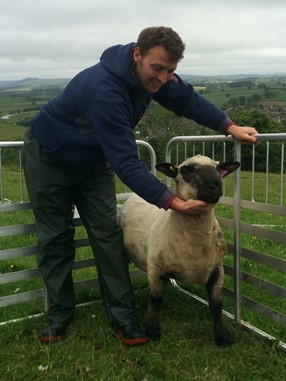Raburn Hampshire Down flock wins the Kelsey Trophy for most genetic gain
 The Raburn flock wins the Kelsey Trophy for the Hampshire Down Flock making the most genetic progress in 2020
The Raburn flock wins the Kelsey Trophy for the Hampshire Down Flock making the most genetic progress in 2020
The coveted Kelsey Trophy, awarded to the performance recording breeder making the most genetic gain in the year, has gone to Joe and Rachel Henry and their Raburn flock for their 2020 crop of lambs. Using Signet Breeding Services performance recording, the Henry’s were able to increase the average lambs genetic potential by 42 Index points compared to last year.
Flocks also making great progress with last year’s lamb crop are the Treworthal (33 points) and Millfields (32 points) flocks. The terminal sire index identifies animals with the best genetics for commercial performance, balancing genetic potential for growth resulting in earlier lamb finishing and heavier carcases, and muscling to increase carcase conformation and value.
Selling rams to commercial customers
The focus of the Raburn flock is producing shearling rams for commercial customers which are long lived, can serve a large number of ewes, and sire easy lambing and vigorous, fast growing lambs. The rams are sold on farm in August at their own on-farm sale, predominantly to repeat customers. The Raburn flock lambs outside in late April and early May, and forage rear their rams to select those that perform the best in the situation they will be working in. The Hampshires are good converters of grass and the Raburn flock hasn’t had any concentrate feed in the last 3 years. Despite the extensive system the Henry’s are easily able to performance record their flock and find the data valuable when it comes to marketing and selecting their animals. The Henrys find that the prices achieved reflect index. Selection pressure is important, both for breeding and sales, to ensure the highest quality of sheep. Of the 21 rams born in 2020 only 12 will be offered for sale.
Performance recording rams benefit commercial customers
Performance recording takes pedigree and performance data and uses this to calculate an animals genetic merit in specific traits like scan weight (growth) or muscle depth (carcase quality) Estimated Breeding Values (EBVs). These EBVs cannot only be used to select the best sheep within a flock, but across the whole breed, taking into account differences in management and just showing genetic merit. The RamCompare project has helped to strengthen this evaluation, taking rams from performance recording flocks from across the country and evaluating their progeny. The project has shown that ram selection has a big impact on farm performance. Selecting the right ram can reduce the days to slaughter by 14 days or add an extra £3-5 to the carcase value for their progeny, when compared to the average ram. This can add a difference of over £1000 just by selecting the right ram over its life time.
Selection in the Raburn Flock
EBVs are a selection tool used in the Raburn flock, but mothering ability, lameness and dagg scores are also used to cull ewes to improve the overall ram product for their customer. The hard selection in the ewes can be seen in the genetic trends of the flock, making fast and continuous progress. A good relationship with their ram buyers is essential and they use feedback from the customers to help inform future breeding decisions and policy. Stock sires have been used from high performing flocks across the country, including the Kelsey, Graylen and Thorbeck flocks which have helped to progress the flock. They have previously used New Zealand blood lines to add lamb vigour and length. Key traits used for ram selection include: Scan Weight EBV, Muscle Depth EBV and the Terminal Index.
Farm Facts:
- 330 acres – Majority Severely Disadvantaged Area
- Flock size: 40 Hampshires, 110 commercial Romney
- Lambing date: April 19th
- 2020 sale date: 27th August
- Other enterprises: 45 Luing suckler cows with progeny sold for breeding or fattened, all out wintered.
About the author
Ed Brant
Ed joined the Signet team in September 2019, once he had got Kelso ram sales out of the way!
He has a degree in Agriculture from Newcastle University and a massive interest in genetics and performance recording.
The family farm in Lincolnshire has pedigree Hampshire Down and Lleyn flocks, as well as commercial sheep and cattle.
 The Raburn flock wins the Kelsey Trophy for the Hampshire Down Flock making the most genetic progress in 2020
The Raburn flock wins the Kelsey Trophy for the Hampshire Down Flock making the most genetic progress in 2020